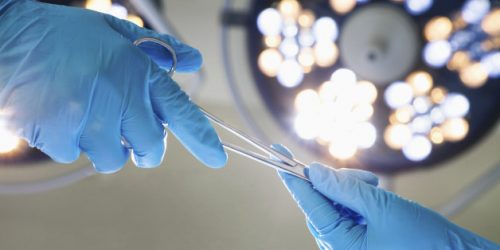
SUSS and Level Medicine are very excited to present a special Grand Rounds on ‘Women in Surgery’.
Five surgeons have generously donated their time for the evening to discuss issues that face all genders. All are welcome to come to hear this diverse panel share their thoughts on work/life balance, surgical training and careers, future directions for the surgical profession, and of course their passion for surgery!
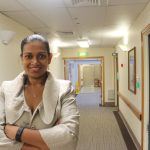 Dr Pecky de Silva is a Vascular Surgeon working at Hornsby Hospital and the Sydney Adventist Hospital. She finished her training in January 2013. During training she went to Singapore for a year and Edinburgh for a year. She started in private practice in November 2013 and in public practice September 2105. She works part time: 3-4 days a week usually, but she is on call 1 in 2, so she can end up working on a day off! She works part-time because she has a gorgeous 3-year-old girl who was born in June 2013. Pecky loves being a surgeon and has a great work-life balance!
Dr Pecky de Silva is a Vascular Surgeon working at Hornsby Hospital and the Sydney Adventist Hospital. She finished her training in January 2013. During training she went to Singapore for a year and Edinburgh for a year. She started in private practice in November 2013 and in public practice September 2105. She works part time: 3-4 days a week usually, but she is on call 1 in 2, so she can end up working on a day off! She works part-time because she has a gorgeous 3-year-old girl who was born in June 2013. Pecky loves being a surgeon and has a great work-life balance!
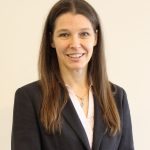 Dr Carolyn Jameson (MBBS BSc(Hons) PhD(Med) FRACS) is a qualified bariatric and advanced laparoscopic surgeon with experience across a number of subspecialty areas. She is a Staff Specialist General Surgeon at Auburn Hospital, surgeon with Sydney Bariatric Clinic, Clinical Lead in Surgery for the eMeds/eMR project at RPA and VMO at Westmead Private Hospital, Norwest Private Hospital and HSS. She completed her surgical training through St Vincent’s Hospital Sydney, Royal Darwin Hospital and RPA. She undertook post-fellowship training in head and neck surgery, surgical oncology, renal and pancreas transplantation and bariatric surgery at the Westmead Hospitals. Dr Jameson is an examiner for RACS, faculty member for the HETI GDESS, tutor for the University of Notre Dame medical school, member of the Racesafe medical motor racing retrieval team and a member of the Kolling Institute of Medical Research. She has worked in regional NSW and overseas in the Solomon Islands and Nepal. Outside her surgical life, Dr Jameson is busy with her family and 3 children.
Dr Carolyn Jameson (MBBS BSc(Hons) PhD(Med) FRACS) is a qualified bariatric and advanced laparoscopic surgeon with experience across a number of subspecialty areas. She is a Staff Specialist General Surgeon at Auburn Hospital, surgeon with Sydney Bariatric Clinic, Clinical Lead in Surgery for the eMeds/eMR project at RPA and VMO at Westmead Private Hospital, Norwest Private Hospital and HSS. She completed her surgical training through St Vincent’s Hospital Sydney, Royal Darwin Hospital and RPA. She undertook post-fellowship training in head and neck surgery, surgical oncology, renal and pancreas transplantation and bariatric surgery at the Westmead Hospitals. Dr Jameson is an examiner for RACS, faculty member for the HETI GDESS, tutor for the University of Notre Dame medical school, member of the Racesafe medical motor racing retrieval team and a member of the Kolling Institute of Medical Research. She has worked in regional NSW and overseas in the Solomon Islands and Nepal. Outside her surgical life, Dr Jameson is busy with her family and 3 children.
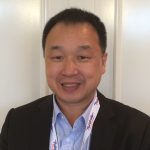 Dr Henry Woo is a urological surgeon with a sub-specialised practice in prostate disease. He has particular research interests in novel treatments for BPH and prostate cancer. He is a board director of the Australian and New Zealand Uro-genital and Prostate Cancer Trials Group (ANZUP) and the Australian Urological Foundation (AUF). He has published extensively and is on the editorial boards of several international journals. He is the Professor of Surgery at the Sydney Adventist Hospital Clinical School of the University of Sydney. Outside of medicine, his interests lie with ‘retro stuff’, vinyl records, live music, travel industry, social media activism and fitness.
Dr Henry Woo is a urological surgeon with a sub-specialised practice in prostate disease. He has particular research interests in novel treatments for BPH and prostate cancer. He is a board director of the Australian and New Zealand Uro-genital and Prostate Cancer Trials Group (ANZUP) and the Australian Urological Foundation (AUF). He has published extensively and is on the editorial boards of several international journals. He is the Professor of Surgery at the Sydney Adventist Hospital Clinical School of the University of Sydney. Outside of medicine, his interests lie with ‘retro stuff’, vinyl records, live music, travel industry, social media activism and fitness.
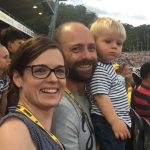 Dr Mifanwy Reece is a SET 4 General Surgical Registrar currently doing Colorectal Surgery at Concord Hospital. Her subspecialty interests include Colorectal and Upper GI Surgery. She lives in Sydney during the week but her home is on the Central Coast, where she hopes to work in the future. Her partner is a Colorectal Surgeon and they have a beautiful 2 year old son who they say is their greatest achievement. Dr Reece loves her job and surgery was an easy career choice to make – but her life is far from easy! She gets a lot of help (a nanny, an au pair, cleaners, parents who visit often and fill the freezer with food, and most importantly, a very supportive partner and devoted father to her son). Dr Reece believes she is a better mother because she has a fulfilling career and she is a better doctor because she is a Mum. She looks forward to a time when surgical training is more flexible so trainees can achieve greater work-life balance – for family, research or whatever they choose.
Dr Mifanwy Reece is a SET 4 General Surgical Registrar currently doing Colorectal Surgery at Concord Hospital. Her subspecialty interests include Colorectal and Upper GI Surgery. She lives in Sydney during the week but her home is on the Central Coast, where she hopes to work in the future. Her partner is a Colorectal Surgeon and they have a beautiful 2 year old son who they say is their greatest achievement. Dr Reece loves her job and surgery was an easy career choice to make – but her life is far from easy! She gets a lot of help (a nanny, an au pair, cleaners, parents who visit often and fill the freezer with food, and most importantly, a very supportive partner and devoted father to her son). Dr Reece believes she is a better mother because she has a fulfilling career and she is a better doctor because she is a Mum. She looks forward to a time when surgical training is more flexible so trainees can achieve greater work-life balance – for family, research or whatever they choose.
Dr Amanda Cuss (B Med Sci Hons, MBBS Hons, B Health Sci) is a SET 3 trainee currently doing Breast Oncoplastic Surgery at Chris O’Brien Life House. Breast Surgery is her area of interest as she enjoys open surgery, the patient dynamics and the ongoing interaction with patients and the multidisciplinary care. It’s also probably slightly more malleable in terms of career and life balance. Dr Cuss has trained at multiple places: Blacktown Hospital, Canterbury Hospital, Concord Hospital, and RPA Hospital, as well as Lismore Base Hospital, Prince of Wales Hospital and Royal Hospital for Women. She has a research background in Immunology from the Centenary Institute and the Garvan Institute. She has just come back from maternity leave and returned to work with a 7.5 month old baby boy. She looks forward to chatting with the medical students and providing an honest view of life as a surgical trainee.
Date: Thursday, June 23, 2016
Time: 6.00 – 7.30 pm
Venue: Kerry Packer Education Centre Auditorium, RPA Hospital
Please RSVP on the Facebook event.
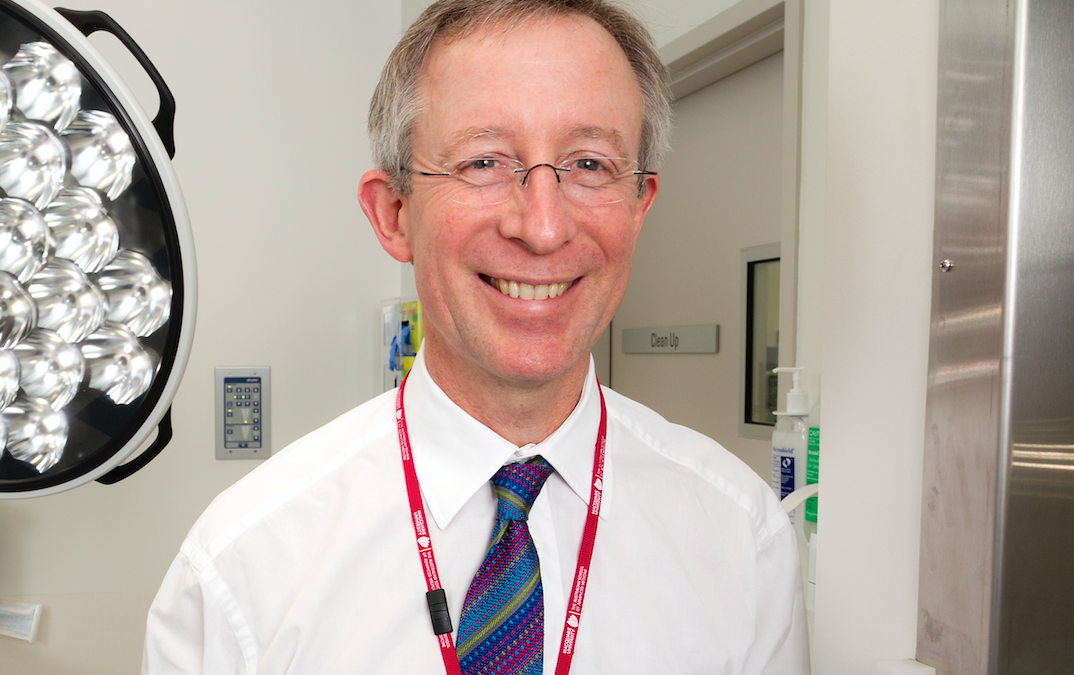
Professor John Cartmill on his path into surgery, work-life balance and how to approach surgeons for shadowing opportunities
By Nathaniel Deboever
Nathaniel Deboever: Which pathway did you take into the surgical field, and would you do it again?
Professor John Cartmill: “I wouldn’t change my pathway, and I don’t think I could have done it differently. Are you familiar with the term teleology? It has the same word root as telomere, from the Greek telos, meaning end or purpose. In other words, a career progression all makes sense looking back, but in prospect who would have known or been able to guess? It feels as though it was more of an evolution; variation and selection, pursuing things that really interested me rather than things that were expected of me (variation). Opportunities came up that those interests had prepared me for (affordances), opportunities I was prepared and excited to take (selection). That process continues of course!
Surgically, it probably started when my father (a cardiothoracic surgeon) taught me to tie surgical knots and my mother demonstrated the correct way to pass the tomato sauce at the dinner table – the firm ‘instrument pass’ that feels a bit like a handshake. There was no pressure one way or the other and it really only occurred to me that I might be a surgeon when I was in second or third year of medical school. I saw a surgeon, David Glenn, performing a triple bypass for pancreatic cancer. I just thought that it was the most beautiful thing I had seen. It was on a patient that I had come to know, she had a very nasty pancreatic cancer, and was going to die, but he improved her lot in the most profound way. I was very moved by it, and I wanted to do it. From then on, I spent a lot of time in the operating room, taking it all in, taking some knocks from scrub nurses and other people who thought I was in the way, but you know that’s where I wanted to be and I would learn people’s names and do all the little things and let it be known that I was interested, volunteer to be an extra set of hands when anyone was needed.
I struggled a bit with the surgical primary College exam (as many do!) and ended up taking time away from the hospital to pursue a Masters in molecular biology while I studied, in the same lab (Cris dos Remedios) where I had enjoyed a BSc(Med). I ended up with some publications, a little bit by accident. I didn’t mean to be an academic surgeon but before I knew it, I had a couple of publications and no one else did, so my CV looked better than the next guy.
A little later on, once I was on the training scheme, I developed an interest in medical error, which at that time no one else was really following. I developed that interest because I thought I was blaming myself for things going wrong, for errors, and I just think I was particularly aware of it and sensitive and didn’t like it happening so I wanted to understand why. An important mentor drew my attention to the cardiothoracic literature which was being influenced by aviation, mining, and industrial safety at the time. So again I had an ‘extra string to my bow’ as a surgical trainee at the time, when it was not all fashionable. I think this is what going off the beaten path is all about, following your passion. That makes it easy.
So then I was a surgical trainee, and I was also very interested in laparoscopic surgery. In the 1980s, lap-choles came around and revolutionized gallbladder surgery. I thought I could transfer some of those advantages to colorectal surgery so I followed laparoscopic surgery to the United States where I worked as a fellow with a group of pioneering laparoscopic surgeons in Minneapolis. Because of my interest, I was invited to spend six months working as an engineer with a biomedical company (Ethicon in Cincinnati). I worked there between a laparoscopic surgery fellowship and a colorectal fellowship at the Cleveland clinic. As a result of that, I got a few patents, so my CV started to look a bit different and special, and after all of that, I was able to come back to Australia as a colorectal surgeon.
My interest in error had developed into the emerging field of neuroscience, communication and teamwork and I was pleased to help develop the PPD (personal and professional development) strand at Sydney University. Again because of my interest in error and people working together, I was introduced to Macquarie University linguists (another unconventional interest for a surgeon) David Butt and Alison Moore and became impressed by the university so when Michael Morgan asked me to help build the fledgling Australian School of Advanced Medicine.. I jumped at it. We are now a full faculty and I expect that some of you reading this will join us at MQ for training and work.
As I said, the process continues.
Through all of this I have continued to work at Nepean Hospital in Sydney’s west.
ND: Could you tell me a bit more about your involvement in the topic of medical error?
JC: I trained in an era when the most frequent response to a medical catastrophe was to find someone to blame and I always felt that I wanted to know how and why it had happened. At the time that would have been called an excuse, but for me it was an explanation, which meant that if we understood it we were less likely to repeat it. So I made it my business to find out and it has been a very interesting obsession (I guess that’s what makes something an obsession: interest). I came back to the medical faculty at Sydney after my time in the States as a senior lecturer. I think this was around the time when the PPD curriculum was being written and I was asked to incorporate my medical error work into that, and I had also decided that it was what I would do. It was just the perfect opportunity to explore medical error at all of its levels. We were encouraged by some forward thinkers in the Health Department to spread the word and I formed a company called ErroMed with Don Wynn, a Qantas captain, anaesthetists Richard Morris and Stavros Prineas, psychologist Stewart Dunn, and physician Darryl Mackender. We had some success with that, and learned at lot. ErroMed continues to do good work internationally although I am no longer a part of it.
I became very interested in how adults learn as a result of designing these courses and working with my ErroMed colleagues who were all extraordinary teachers.
More recently I’ve been pleased to meet like-minded surgeons as we have developed the Training in Professional Skills (TIPS) course for the Royal Australasian College of Surgeons.
ND: So how did you end up at Macquarie University?
JC: I was asked to join largely because of my research in teamwork and medical error. At that time all of the neurosurgeons in New South Wales had taken the ErroMed courses, and so I was reacquainted with Professor Michael Morgan, the foundation Dean of the Australian School of Advanced Medicine at MQ (now the FMHS). I had enjoyed a wonderful collaboration with David Butt and Alison Moore looking at Systemic Safety so I was very pleased to join the staff of the University. The ongoing development of the Faculty, the Macquarie University Hospital and my role within it has been wonderful.
As your career develops, you move from someone who hopes to be appointed, to someone who gets appointed and ultimately you become involved in the appointing. If there was a rule of thumb it would be to always appoint someone who is better than you are. Then you get to work with them and that’s really awesome because they bring you on too. I have had that experience particularly with Tony Eyers, Anil Keshava, Matt Rickard and Andrew Gilmore, all talented colorectal surgeons. They are super people, we all work together, and we are better because of it.
Macquarie University is a very well run university. That is why they have been able to finance, build, staff and have their hospital succeed as part of their Faculty of Medicine and Health Sciences. No other Australian University has done this.
ND: Now, what about work-life balance? Could you talk a bit about that in the life of a surgeon?
JC: Better to not ask me about work-life balance! It’s a thing that I have not been good at, and I have needed professional help with it. At times I have been so single-minded, nothing else mattered. That is one way to succeed of course, and to some extent that uncompromising passion is necessary – at least it was for me. I think that if you find yourself completely foregoing pleasure, it should be a warning sign and you might need to go see somebody about it. That sort of workaholism is much better understood now at a psychological level than it was when I began surgery. I am not sure it is something you should ask a surgeon for advice on. Deep down, it has to do with personality types, it’s just that the sort of people that often succeed at surgery can be uncompromising and might overdo it. I am not saying that’s right or wrong – it certainly makes for an interesting and useful life – but try to do it with some insight!
ND: Is there anything you wish you had done differently with regards to work-life balance?
JC: Probably. It’s a regret that I haven’t been a more supportive husband, but I’ve been fortunate to have an extraordinary wife who has made significant career sacrifices for me and for our children. I regret that. You know, there I was thinking I was making sacrifices working hard and so on but she was making sacrifices that were just as profound, probably more so. I have two fabulous children that do know me, I did go to speech nights, I usually went to parent-teacher interviews; you know, I did drive to school once a week, but with hindsight I think I could have done more without compromising the surgery.
ND: So with regards to having a family along with pursuing a career in surgery, do you have any advice about that?
JC: My advice would be to go for both. A surgical career does give you some important advantages when it comes to raising a family. You are a pillar of the community! And so you’re the sort of person who should be having a family if you want one, you’ve got good values and principles that are strong, and financially, you become a good provider.
The College is open minded about all of this and you will find advice and even the opportunity to take breaks from training or share a training position.
ND: Changing the topic a bit, do you have any advice for medical students aspiring to be a part of the surgical field?
JC: I would say I was excited for you but do not compromise. I have students that came to me asking for advice, knot tying or needle holder tutorials and so on which I always enjoy – but when they came back, it is so clear whether or not they’ve been practicing. These simple techniques; one and two handed knots, left and right handed, needle holder palmed not restricted by finger holes are not arbitrary, they are part of the surgeon’s vocabulary, the way you will make your mark on the world – or not. What can I do? I can’t practice for them. The sooner you start your ‘ten thousand hours’, the better. On the other hand, if you have been practicing, if you can tie the knot when it is offered to you in the theatre then it will make a big impression. I can still name those students who showed me they could do it and I have enjoyed watching their careers develop since.
The theatre is a complicated, wonderful, consequential space. The theatre nurses rule there, as they should, and they will respond well to intelligent questions, offers of help. Don’t wait to be asked to write your name on the white board. Take it all in, be humble, being in that space at all is a privilege. Answer the telephone if rings – don’t just stand there – “Theatre 6, Nathaniel speaking, how can I help?”.
ND: What about advice on how students should approach surgeons for guidance, and teaching opportunities?
JC: Be sensitive when you ask us. This comes down to human factors and a bit of emotional intelligence. If they’re looking like they’re thinking about something else, don’t ask them. It’s a job that often carries a fair bit of cognitive load. For a surgeon, a good hint that they are open to hear from you is when they go non-clinical – start to talk about something else, you know, the cricket, or a movie they saw, when they begin to close an operation, or at the end of a tutorial or lecture, when they’re not in a rush. Give them a minute as they take off their gown to check their phone and so on. Follow them into the tea room. It should be self-evident. Sometimes you can be a little bit blind to those subtleties when you are nervous, so I would just say use your emotional intelligence (be mindful). You could try approaching the secretary, and be very very nice to him or her. The surgeon wouldn’t be where they are without that secretary. If they are a good secretary, and they invariably are, you are essentially speaking to the same person.
If it’s the surgeon themselves you are asking you could do worse than say “I’m a medical student and I’m interested in surgery, I’m really interested in what you do. Can I spend a day with you when I’m next on holiday?” You know, you’re making a proposal, you should dress like you mean it, wear a name badge, stand up straight, look them in the eye, pick your time; all advice your mother or father would give you.

 Dr Pecky de Silva is a Vascular Surgeon working at Hornsby Hospital and the Sydney Adventist Hospital. She finished her training in January 2013. During training she went to Singapore for a year and Edinburgh for a year. She started in private practice in November 2013 and in public practice September 2105. She works part time: 3-4 days a week usually, but she is on call 1 in 2, so she can end up working on a day off! She works part-time because she has a gorgeous 3-year-old girl who was born in June 2013. Pecky loves being a surgeon and has a great work-life balance!
Dr Pecky de Silva is a Vascular Surgeon working at Hornsby Hospital and the Sydney Adventist Hospital. She finished her training in January 2013. During training she went to Singapore for a year and Edinburgh for a year. She started in private practice in November 2013 and in public practice September 2105. She works part time: 3-4 days a week usually, but she is on call 1 in 2, so she can end up working on a day off! She works part-time because she has a gorgeous 3-year-old girl who was born in June 2013. Pecky loves being a surgeon and has a great work-life balance! Dr Carolyn Jameson (MBBS BSc(Hons) PhD(Med) FRACS) is a qualified bariatric and advanced laparoscopic surgeon with experience across a number of subspecialty areas. She is a Staff Specialist General Surgeon at Auburn Hospital, surgeon with Sydney Bariatric Clinic, Clinical Lead in Surgery for the eMeds/eMR project at RPA and VMO at Westmead Private Hospital, Norwest Private Hospital and HSS. She completed her surgical training through St Vincent’s Hospital Sydney, Royal Darwin Hospital and RPA. She undertook post-fellowship training in head and neck surgery, surgical oncology, renal and pancreas transplantation and bariatric surgery at the Westmead Hospitals. Dr Jameson is an examiner for RACS, faculty member for the HETI GDESS, tutor for the University of Notre Dame medical school, member of the Racesafe medical motor racing retrieval team and a member of the Kolling Institute of Medical Research. She has worked in regional NSW and overseas in the Solomon Islands and Nepal. Outside her surgical life, Dr Jameson is busy with her family and 3 children.
Dr Carolyn Jameson (MBBS BSc(Hons) PhD(Med) FRACS) is a qualified bariatric and advanced laparoscopic surgeon with experience across a number of subspecialty areas. She is a Staff Specialist General Surgeon at Auburn Hospital, surgeon with Sydney Bariatric Clinic, Clinical Lead in Surgery for the eMeds/eMR project at RPA and VMO at Westmead Private Hospital, Norwest Private Hospital and HSS. She completed her surgical training through St Vincent’s Hospital Sydney, Royal Darwin Hospital and RPA. She undertook post-fellowship training in head and neck surgery, surgical oncology, renal and pancreas transplantation and bariatric surgery at the Westmead Hospitals. Dr Jameson is an examiner for RACS, faculty member for the HETI GDESS, tutor for the University of Notre Dame medical school, member of the Racesafe medical motor racing retrieval team and a member of the Kolling Institute of Medical Research. She has worked in regional NSW and overseas in the Solomon Islands and Nepal. Outside her surgical life, Dr Jameson is busy with her family and 3 children. Dr Henry Woo is a urological surgeon with a sub-specialised practice in prostate disease. He has particular research interests in novel treatments for BPH and prostate cancer. He is a board director of the Australian and New Zealand Uro-genital and Prostate Cancer Trials Group (ANZUP) and the Australian Urological Foundation (AUF). He has published extensively and is on the editorial boards of several international journals. He is the Professor of Surgery at the Sydney Adventist Hospital Clinical School of the University of Sydney. Outside of medicine, his interests lie with ‘retro stuff’, vinyl records, live music, travel industry, social media activism and fitness.
Dr Henry Woo is a urological surgeon with a sub-specialised practice in prostate disease. He has particular research interests in novel treatments for BPH and prostate cancer. He is a board director of the Australian and New Zealand Uro-genital and Prostate Cancer Trials Group (ANZUP) and the Australian Urological Foundation (AUF). He has published extensively and is on the editorial boards of several international journals. He is the Professor of Surgery at the Sydney Adventist Hospital Clinical School of the University of Sydney. Outside of medicine, his interests lie with ‘retro stuff’, vinyl records, live music, travel industry, social media activism and fitness. Dr Mifanwy Reece is a SET 4 General Surgical Registrar currently doing Colorectal Surgery at Concord Hospital. Her subspecialty interests include Colorectal and Upper GI Surgery. She lives in Sydney during the week but her home is on the Central Coast, where she hopes to work in the future. Her partner is a Colorectal Surgeon and they have a beautiful 2 year old son who they say is their greatest achievement. Dr Reece loves her job and surgery was an easy career choice to make – but her life is far from easy! She gets a lot of help (a nanny, an au pair, cleaners, parents who visit often and fill the freezer with food, and most importantly, a very supportive partner and devoted father to her son). Dr Reece believes she is a better mother because she has a fulfilling career and she is a better doctor because she is a Mum. She looks forward to a time when surgical training is more flexible so trainees can achieve greater work-life balance – for family, research or whatever they choose.
Dr Mifanwy Reece is a SET 4 General Surgical Registrar currently doing Colorectal Surgery at Concord Hospital. Her subspecialty interests include Colorectal and Upper GI Surgery. She lives in Sydney during the week but her home is on the Central Coast, where she hopes to work in the future. Her partner is a Colorectal Surgeon and they have a beautiful 2 year old son who they say is their greatest achievement. Dr Reece loves her job and surgery was an easy career choice to make – but her life is far from easy! She gets a lot of help (a nanny, an au pair, cleaners, parents who visit often and fill the freezer with food, and most importantly, a very supportive partner and devoted father to her son). Dr Reece believes she is a better mother because she has a fulfilling career and she is a better doctor because she is a Mum. She looks forward to a time when surgical training is more flexible so trainees can achieve greater work-life balance – for family, research or whatever they choose.